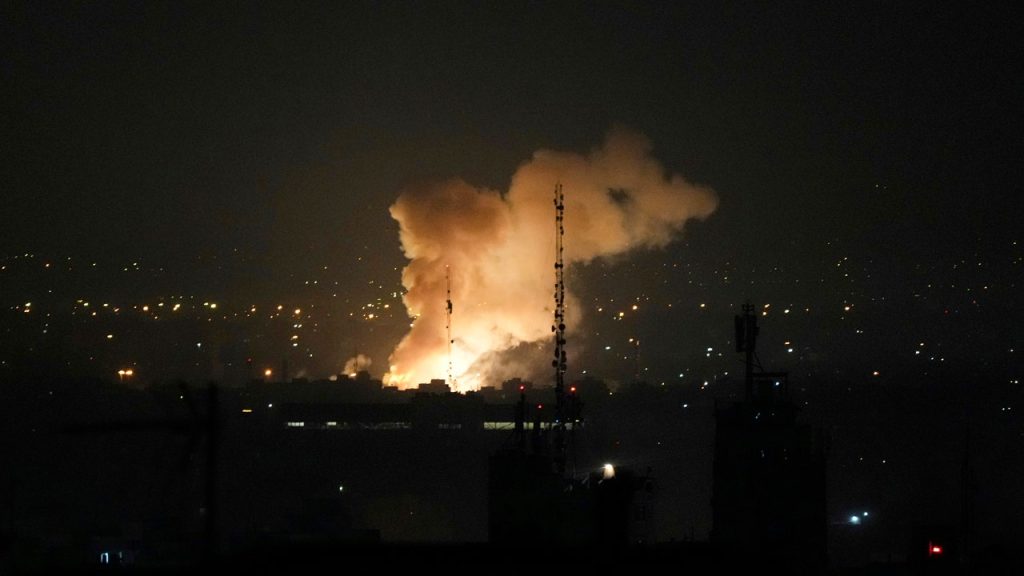A significant escalation in Middle Eastern tensions was marked today as Israel initiated extensive military strikes targeting Iran’s nuclear facilities. This sharp military action comes amid rising fears over the security implications of Iran’s nuclear developments. In a statement, officials confirmed the commencement of “Operation Rising Lion,” which aims to ensure the survival of Israel amid these escalating regional threats.
| Article Subheadings |
|---|
| 1) Details of the Military Strikes |
| 2) Political Reactions and Confirmations |
| 3) Historical Context of Tensions |
| 4) Global Community’s Response |
| 5) Potential Implications for the Future |
Details of the Military Strikes
Early this morning, Israeli forces launched a series of precise airstrikes targeting key components of Iran’s nuclear infrastructure. The operation was reportedly executed through advanced intelligence that identified critical sites, including enriched uranium facilities. According to military sources, these strikes aimed to disrupt Iran’s capacity to develop nuclear weapons, thereby enhancing Israel’s security.
The timing of the strikes was crucial, as Iranian leaders had announced plans to expand their nuclear capabilities significantly. This military strategy appears to follow Israel’s long-standing policy of preemption against perceived existential threats. Israel’s Prime Minister highlighted that in light of Iran’s continued nuclear ambitions, these strikes were necessary to safeguard the country’s future.
Political Reactions and Confirmations
Following the strikes, a wave of political reactions flooded in from various leaders. In a significant revelation, former President Donald Trump confirmed that he was informed about the operations beforehand, stating that they were necessary for Israel’s safety. His remarks echo heightened concerns about Iran’s nuclear trajectory and its implications for regional stability.
Reactions within the United States varied, with some officials expressing support for Israel’s actions while others cautioned against escalating military confrontations. Moreover, opposition leaders criticized the Biden administration for failing to prevent such an escalation, suggesting that diplomatic channels should have been prioritized.
Historical Context of Tensions
The hostility between Israel and Iran has deep historical roots that can be traced back decades, largely driven by ideological and geopolitical factors. Iran’s 1979 Islamic Revolution marked the beginning of direct opposition between the two nations. This conflict intensified with Iran’s nuclear ambitions, which Israel perceives as an existential threat.
Over the years, Israel has engaged in various forms of military action aimed at crippling Iran’s nuclear program. Additionally, Israel’s concerns are compounded by Iran’s support for militant groups like Hezbollah and Hamas, which threaten Israeli security. The strikes today represent a significant escalation in what has been a protracted and volatile conflict.
Global Community’s Response
The international community reacted swiftly to the news of Israel’s military operation. While several Western countries expressed support for Israel’s right to defend itself, there were significant concerns regarding the potential for increased violence in the region. Countries such as Russia and China condemned the strikes, urging all parties involved to de-escalate tensions and pursue diplomatic solutions instead.
The United Nations called for an emergency meeting to address the crisis, emphasizing the need to prioritize dialogue over military actions. Regional allies of Iran expressed solidarity, further complicating an already tense situation. The potential for retaliatory actions from Iran remains a focal point of concern among world leaders, particularly regarding the possibility of direct confrontation.
Potential Implications for the Future
As the dust settles from these military strikes, analysts are increasingly concerned about the broader implications for the Middle East. The operation could set off a series of retaliatory actions by Iran and its proxies, leading to an escalation of conflicts across the region. This reality poses daunting challenges for both Israeli and Iranian policymakers who are forced to navigate a rapidly changing landscape.
Furthermore, there are concerns regarding international negotiations related to Iran’s nuclear program. With trust eroding, any hope for diplomatic resolution may seem increasingly distant. The present scenario underscores the precarious balance between military engagement and the pursuit of long-term peace. The situation remains fluid, demanding close attention from global leaders and analysts alike.
| No. | Key Points |
|---|---|
| 1 | Israel conducted extensive airstrikes on Iran’s nuclear facilities to undermine its atomic ambitions. |
| 2 | Former President Donald Trump confirmed prior knowledge of the strikes, citing Israel’s necessity for survival. |
| 3 | The strikes are part of Israel’s long-standing strategy of preemption against threats from Iran. |
| 4 | Global reactions were mixed, with some nations supporting Israel while others condemned the military actions. |
| 5 | The potential for retaliatory actions by Iran raises concerns about the future stability of the region. |
Summary
The unfolding situation surrounding Israel’s military strikes on Iran’s nuclear facilities embodies the critical tensions of the Middle East. As both nations brace for possible repercussions, the broader implications for regional security and international diplomacy become increasingly complex. The international community’s response will be pivotal in determining the course of events, underscoring the necessity for dialogue amidst conflict.
Frequently Asked Questions
Question: Why did Israel conduct airstrikes on Iran’s nuclear facilities?
Israel launched these strikes to counter perceived threats posed by Iran’s expanding nuclear capabilities, aiming to safeguard its national security.
Question: What was the international response to the strikes?
Reactions varied; some Western nations supported Israel’s actions, while others, particularly Russia and China, condemned the attacks and called for diplomatic resolution.
Question: How might Iran respond to these strikes?
Iran could respond with retaliatory actions, raising concerns about escalation and the potential for further military conflict in the region.


